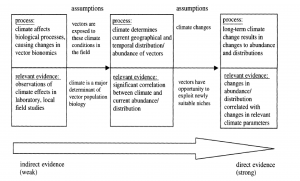When conducting literature review, it is important that we use reliable sources in order to obtain the most accurate information. Especially, when it comes to the topic of climate change, citing sound data from a reputable organization is even more important, as the issue is still widely debated in American politics. The criteria that I use to critically examine a source includes:
- Who are the authors of the essay? What are their academic backgrounds and experience?
- Are the sources cited by the writing from peer-reviewed articles or other credible reports?
I chose to analyze an academic journal article,“Early Effects of Climate Change: Do They Include Changes in Vector-Borne Disease?,” published by the Royal Society. According to the publisher’s website, the Royal Society has been chartered since the 1660s, with the goal of recognizing, promoting and supporting scientific research to encourage the use of science for developing humanity. The society is comprised of prominent scientists, with a total of 8000 elected members over the past four centuries. Many distinguished scientists, such as Albert Einstein, Isaac Newton, and Stephen Hawking, are members of the society. For this particular journal, the authors come from strong scientific backgrounds. Sari Kovats, one of the authors, has been actively researching the links between climate change and its effects on human health for over the past 15 years. She was the co-Coordinating Lead Author for Chapter 23 on Europe in the IPCC Fifth Assessment Report. Tony McMichael, one of the other authors, chaired the committee assessing health risks for the United Nations Intergovernmental Panel on Climate Change between 1993-1996 and worked for the National Centre for Epidemiology and Population Health at the Australian National University in Canberra, where he published his highly-regarded research linking global environmental change to the spread of infectious diseases. Alistair Woodward led the writing of the health section of the 5th assessment report for the Intergovernmental Panel on Climate Change. Based on the background of the publisher, and the journal’s authors, we can make the assessment that this journal is coming from a reputable source, where all the contributing authors have had extensive research experience on the issue discussed.
In the journal, the authors review existing literature on climate change, vector-borne diseases and studies linking climate change and vector-borne diseases, to assess the quality of existing evidence on the issue and design criteria to conduct successful experiments. Citing the IPCC, the authors recognize that there have been anthropogenic-induced warming patterns across the globe over the past few decades. In theory, a change in climate, such as warmer temperatures and wetter conditions, will cause changes in the geographic range, seasonality, and incident rates of vectors. The authors cited multiple scientific reports on studies of increasing tick populations in Sweden or increase in malaria incidences after dam construction, to assess the quality of data related to the issue. They recognize that there is not enough robust evidence linking climate change to increases in vector-borne diseases, due to the fact that there have not been enough long-term studies (>10 years) on the issue, as the topic of study had just emerged in recent decades. Other alternative explanations to increasing vector-borne diseases can be attributable to socioeconomic, demographic and environmental effects, enough to cast doubt on the role of climate change. However, as the authors noted, the existing evidence is highly suggestive and the linkage must be seen as “absence of evidence” rather than “evidence of absence.”

Figure 1. The process through which climate change may affect vectors. Source: Kovats et al. (2000)
Throughout the academic journal, the authors remained unbiased and scientific. Every statement was supported by multiple cited sources, as expected from a peer-reviewed article. The authors recognized that there is strong evidence, but not robust enough. Since the article reviews all existing evidence of linkages between climate change and vector-borne diseases, the authors’ research and work backgrounds provide credibility to their assessment. Thus, in my opinion, this source is highly trustworthy.
Sources Cited:
London School of Hygiene and Tropical Medicine. 2017. About us: Dr. Sari Kovats. Retrieved from https://www.lshtm.ac.uk/aboutus/people/kovats.sari
McKee and C. Butler. 2014. Tony McMichael Obituary. The Guardian. Retrieved from https://www.theguardian.com/society/2014/oct/13/tony-mcmichael
The University of Auckland. University directory search: Professor Jack Woodward. Retrieved from https://unidirectory.auckland.ac.nz/profile/a-woodward
The Royal Society. History of the Royal Society. Retrieved from https://royalsociety.org/about-us/history/
Kovats, R.S., Campbell-Lendrum, D.H., McMichel, A.J., Woodward, A. and Cox, J.S.H., 2001. Early effects of climate change: do they include changes in vector-borne disease?. Philosophical Transactions of the Royal Society of London B: Biological Sciences, 356(1411), pp.1057-1068.
